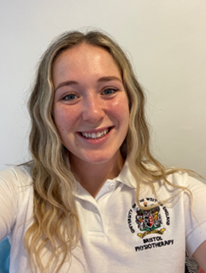An introduction to virtual leadership placements
We are final year physiotherapy students studying at the University of the West of England, Bristol. In summer 2022 we received our placement allocation informing us that we would be undertaking a non-traditional leadership placement. We had the pleasure of working in the office of the Chief Allied Health Professions (AHP) Officer within NHS England. We were tasked with creating an Easy Read document for the AHP Strategy for England (2022-2027): AHPs Deliver 1 Initially, we were apprehensive due to the feeling of being left behind and missing out on clinical experiences. On reflection, we can confidently say that this placement has not only elevated our transferable skills, but also, has shaped us as competent, well-rounded future physiotherapists, with more diverse learning experiences.
Leadership
As three students from different backgrounds and lived experiences, we each had individual development goals, but shared the same aspiration to build on our leadership skills.
The Health Care Professions Council, HCPC 2 advocate that development of leadership skills at all levels will better equip the future workforce and ensure service user well-being is protected and care experiences continuously improve. In support of this, the Chartered Society of Physiotherapy, (CSP)3 consider leadership as a skill rather than a senior role that should be occurring at all levels. Influenced by the Guide to Practice Based Learning (PBL) for AHP Students in Leadership 4, this placement enabled us to begin to shape ourselves as leaders. This was achieved by building on our self-confidence and self-awareness through opportunities such as liaising with senior strategic leads within NHS England and facilitating discussions with co-production groups on project work.
What resonates with us was the insight we gained into the importance of leadership at all levels within a healthcare setting. Equally the value added of having diverse leadership which includes AHPs 5. Before commencing the placement, our understanding of the impact of leadership on teams and organisations was limited but by the end we recognised that good leadership has a direct impact on patient outcomes. This is reflected in the NHS Leadership Academy’s statement 6 that …”better leadership leads to better patient care, experience and outcomes”. We also came to learn that exercising leadership qualities can occur at any level, whereby you can inspire and engage others.
Hybrid working
During the placement, we adapted to hybrid working, where we undertook a combination of both in-person and remote working. We have found this blend offers increased flexibility, boosts productivity, and enables the development of new skills, which a traditional placement may have not provided. The research suggests that students reported better communication, digital and time management skills all of which are transferable to clinical practice 7. With reference to the AHP Strategy for England 8 it is key that we as healthcare professionals learn to use appropriate technologies to deliver the best quality care. In light of the pandemic this need has escalated, and it is our responsibility as the future workforce to embrace these technological changes. The strategy reinforces its commitment to ensuring AHPs are better equipped with the right skills upon qualifying; therefore, a leadership placement could not be more beneficial in facilitating this. We have further recognised the value that Hybrid working can bring in terms of enabling inclusivity, as it makes the workplace more accessible. During the placement we were able to work with people across the country and those with reduced mobility who may find it more difficult to attend face-to-face meetings. This shed light on the opportunities hybrid working provides, enabling more people to remain part of the conversation, and ensuring better collaboration.
Hybrid working has also shed light on how to better manage our time and ensure a positive work/life balance. We each had to adapt to predominantly working from home and it was a learning curve to manage our well-being appropriately to ensure we engaged in the placement opportunities, this is hugely relevant within a healthcare setting as supported by Ghoussab et al. 9 who highlights that looking after your well-being should be just as much a priority as your day-today work to ensure safer practice and the optimal care of those in your care. Having this self-awareness will also shape us as good leaders as Ghoussab et al. 9 goes on to say successful leaders allow time for doing the things they enjoy as well as inspiring people and initiating positive change. This is what each of us hope to carry forward in our future careers.
Coproduction
Teamworking skills are essential in any facet of life, but this placement enabled us to really harness these skills. Coproduction is a concept we as students were less familiar with and quickly learnt that it requires more than just participating. Coproduction is also one of two guiding principles in the new AHP Strategy for England 8. The Chartered Society of Physiotherapists 10 highlight that coproduction is about involving those with lived experiences and sharing equal roles in decision making, design and delivery of projects and we took this concept forward with us in the production of the AHP Strategy Easy Read. We facilitated a strategic coproduction group in which we heard the voices and opinions of people and communities with lived experiences of health and social care. This provided insight into what is important to this audience. The feedback we received demonstrated the impact that working inclusively with this group of people can have.
Reflection on the experience
We are extremely proud of what we have produced. The ‘Easy Read’ document has already been recognised as a valuable resource to our immediate team. We are now in a position to pave the way for leadership placements by promoting our work and supporting future AHP students who may be considering these opportunities. This blog is one example of this.
From day one of this placement, we were immediately made to feel like valuable members of the professional office we were representing. It was an inclusive culture and student opinion was valued and we were involved in weekly team planning. Also, it was a friendly environment, and we were able to build personal relationships with people we worked with. In addition to this, we have now made contacts for life and have a support network to lean on through our careers. We have now harnessed a combination of leadership qualities and a better understanding of multidisciplinary working, which is supported by the work of Lawton et al 6 who identified that these placement opportunities aid students building professional relationships and leadership skills, which they may not necessarily get in traditional placements. Specific leadership qualities we have developed include communicating with a wide range of professionals and people that access services, enabling us to strengthen our Multi Disciplinary Team (MDT) working and patient communication skills. We have also had to practice project management and organisational skills, which are key transferrable skills to any future occupation.
Reference list:
- NHS England, (2022a) The Allied Health Professional Strategy for England (2022-2027): AHPs Deliver [online]. Available from: https://www.england.nhs.uk/wp-content/uploads/2022/06/allied-health-professions-strategy-for-england-ahps-deliver.pdf [Accessed 18 October 2022].
- Health and Care Professions Council (HCPC) (2020) Prioritising Leadership in our Standards of Proficiency [Online]. Available from: https://www.hcpc-uk.org/news-and-events/blog/2020/prioritising-leadership-in-our-standards-of-proficiency [Accessed 09 November 2022].
- The Chartered Society of Physiotherapy, CSP (2022a) Leadership Development Programme [online]. Available from: https://www.csp.org.uk/professional-clinical/leadership/leadership-development-programme [ Accessed 09 November 2022].
- Health Education England, HCPC (2021) Guide to Practice Based Learning (PBL) for Allied Health Professional (AHP) Students in Leadership [online]. Available from: https://www.hee.nhs.uk/our-work/allied-health-professions/increase-capacity/ahp-practice-based-learning [Accessed 12 November 2022].
- NHS England, (2019) Investing in chief allied health professionals: insights from trust executives [online]. Available from: https://www.england.nhs.uk/publication/investing-in-chief-allied-health-professionals-insights-from-trust-executives/ [Accessed 30 October 2022].
- NHS Leadership Academy (2021) NHS Leadership Academy [online]. Available from: https://www.healthcareers.nhs.uk/career-planning/developing-your-health-career/developing-your-health-career/nhs-leadership-academy/nhs-leadership-academy [Accessed 09 November 2022].
- Lawton, V, Vaughan, R, Jones, T M and Pacey, V (2021) Rising to the Challenge of COVID-19: Pivoting to Online and Project-Based Physiotherapy Student Placements in Contemporary Professional Settings. International Journal of Practice-Based Learning in Health and Social Care [online]. 9 (2), pp. 21-38 [Accessed 18 October 2022].
- NHS England, (2022) The Allied Health Professional Strategy for England (2022-2027): AHPs Deliver Easy Read [online]. Available from: https://www.england.nhs.uk/wp-content/uploads/2022/10/The-Allied-Health-Professions-Strategy-for-England-Easy-Read.pdf [Accessed 18 October 2022].
- Ghossoub, Z., Nadler, R. and El-Aswad, N. (2018) Targeting Physician Burnout Through Emotional Intelligence, Self-Care Techniques, and Leadership Skills Training: A Qualitative Study. Mayo Clinic Proceedings: Innovations, Quality & Outcomes. [online]. 2 (1), pp.78–79 [Accessed 09 November 2022].
- The Chartered Society of Physiotherapy, CSP (2022b) The Value of Coproduction [online]. Available from: https://www.csp.org.uk/frontline/article/value-co-production [Accessed 09 November 2022].
Authors

Tabitha Hayden
Hello, my name is Tabitha Hayden, and I am a third year Physiotherapy student at the University of the West of England, Bristol. During my degree programme I have had clinical placements in MSK outpatients, complex care, neurosurgery, community paediatrics and a virtual leadership placement with NHS England. I am keen to develop my leadership skills further post-graduation and look forward to experiencing more areas of physiotherapy. In my spare time I enjoy travelling and visiting the Isle of Wight, where I grew up.

Georgie Wyman
Hello, my name is Georgie, and I am a third year Physiotherapy student at the University of the West of England, Bristol. During my degree programme I have had clinical placements in paediatrics, community neurology, private musculoskeletal, respiratory intensive care/research and of course a virtual leadership placement. Alongside further developing my leadership skills on graduation my long-term goal is to work in neuro rehabilitation. In my spare time I enjoy surfing and long distance running and I’m currently training for my first ultra-marathon.

Emily Travis
Hello, my name is Emily Travis, and I am a third year Physiotherapy student at the University of the West of England, Bristol. During my degree programme I have had placements in trauma orthopaedics, a residential home for adults with physical disabilities, neuro rehabilitation in paediatrics; MSK outpatients and of course a virtual leadership placement with NHS England – all of which have taught me so much. Alongside further developing my leadership skills, after graduation I look forward to widening my scope of practice with a long-term goal of working in paediatrics. In my spare time I enjoy music events and keeping up with my fitness through weight training and long-distance running. I look forward to working in the Southwest as a change of environment from being a born and bred Northerner.
Acknowledgement:
With thanks to our placement educator and mentor Dr Janice St. John-Matthews who inspired us and gave us the utmost support throughout.
Declaration of interests: We have read and understood the BMJ Group policy on declaration of interests and declare the following: None.